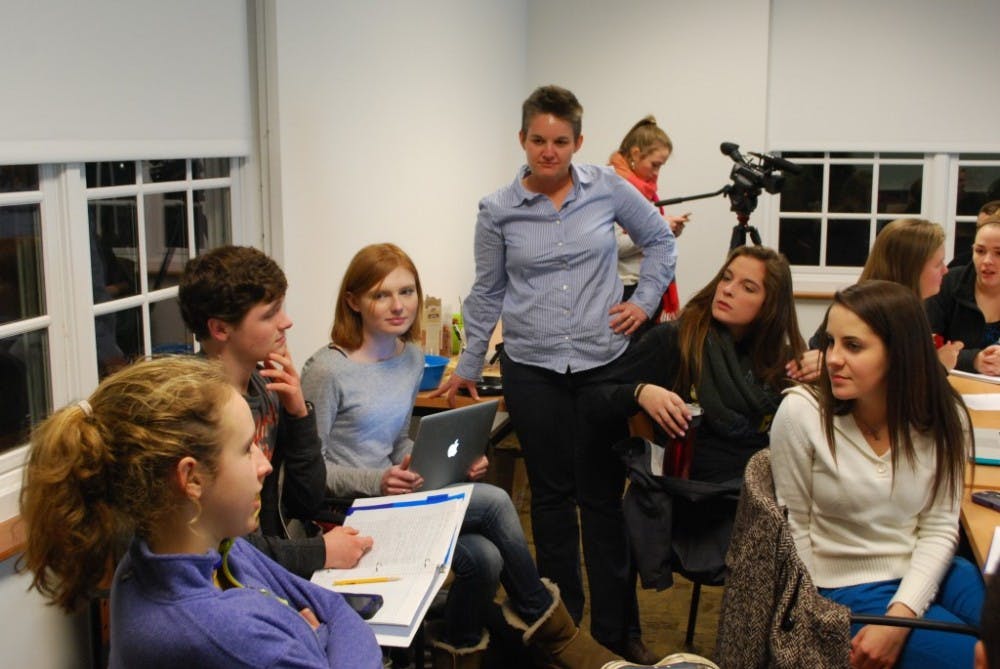The “Beyond Faith and Reason: Same-sex marriage” discussion on Wednesday night in Numen Lumen Pavilion focused on what religion has to say about homosexuality. Kate Bruce, assistant professor of sociology at Elon University, led a conversation on the history, morality and future of same-sex marriage.
“We’re here to explore how the many religious, moral and family influences go together, and how we reconcile those when we’re set with a vote on same-sex marriage,” Bruce said.
Bruce ran through a brief overview of the gay rights movement, noting marriage was not always at the forefront of the campaign. She said many gay people viewed marriage as inherently oppressive, so they focused their efforts on issues like employment nondiscrimination, custody rights and adoptive rights.
The same-sex marriage debate took off on the national stage in 1991, when a lesbian couple in Hawaii sued over the state’s marriage restrictions. Many religious groups across the United States fired back; saying same-sex marriage violated the sanctity of marriage.
Last year was a monumental year for same-sex couples, with 17 states and Washington D.C. recognizing same-sex marriages. While North Carolina has a constitutional amendment against gay marriage, Bruce says legalization is likely to happen within the next five to ten years.
“We’ve carved out an interesting legal situation where states don’t have to recognize other states’ marriage laws. The general consensus is that kind of legal situation can’t last for too long,” she said.
Elizabeth Rogers, dean of the Elon University School of Health Sciences, is less optimistic. She said that while attitudes are changing faster than ever, there is a lot of work to do before a state like North Carolina will recognize same-sex marriage.
“I think it’s only a matter of time until same–sex marriage is legalized,” Rogers said. “I think 2012 was a turning point. When Minnesota voted down a same sex marriage ban, and Maine and Maryland voted for gay marriage, it was a big win. However, I think states like N.C. will hold out as long as they can.”
Bruce studied the same-sex marriage debate, noting arguments about morality and family made by both sides.
“You often hear traditional values versus equal rights. I thought there was a lot more going on there. I found a lot of talk about morality on both sides of the issue. What’s the moral thing to do as a citizen? What’s the moral thing for the government to do?” she asked.
Though the panel agreed attitudes towards same-sex marriage are changing, most religions do not recognize same-sex couples. Many students said that despite what their religion says about gay marriage, they base their opinion off their own set of moral principles.
“I’m a Christian,” freshman Carolina Patterson said. “Officially, we’re not supposed to believe in gay marriage, but I don’t think you can fight love. I think religion should be about trying to understand people. Excluding gay people is hurtful and doesn’t help anybody.”
Elizabeth Rogers said within the Elon community she and her partner, Marianne Hart, feel safe, but outside the Elon bubble they would not be as open about their marriage. She said this has a lot to do with the open-mindedness of the faculty and the students on campus.
“We find that young people say: well my church teaches this, but it just doesn’t make sense to me,” said Hart.
The group watched clips from the documentary “For the Bible Tells Me So.” The film featured several religious scholars, including Bishop Desmond Tutu, discussing the hotly debated Leviticus 18:22 ban on homosexual activity.
Most scholars in the clip agree that the verse only means homosexuality is “ritually impure.” The film argued that there is nothing inherently immoral about gay marriage just as there is nothing inherently immoral about eating pork.
“A lot of these rituals were so that people could feel deliberately holy just going about their daily lives,” Patterson said
Bruce asked the panel to discuss the effect gay marriage will have on the American family structure. Bruce cited a long-term study of same sex parents with families that showed no measurable difference between children’s well-being in terms of graduation rates, discipline, juvenile delinquency, and abuse. Where there was a difference, they actually found gay parents performed better.
“I don’t think it’ll change the American family. As long as the child is taken care of and loved I’m fine with it,” Elon freshman Jenna Rohde said.


